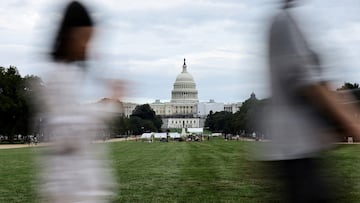How many government shutdowns have been there in US history?
Should the US government shut down next week it wouldn’t be the first time that government fudning paralysis has caused a federal work stoppage.

The frequency of government shutdowns has reduced since the 1980s but they have become longer and more damaging. The fact that the US government can even have a shutdown all comes down to a quirk in the way the US is governed that no other country has to deal with.
There have been a 20 “funding gaps,” when funds were not appropriated to the federal government for a few hours or even days, since 1976. The six times prior to 1980 did not result in any work stoppage by the federal government. Ten of the funding gaps had little effect on the operations of the federal government, lasting just a few days or less and occuring during weekends.
Four “real” shutdowns, however, have been bruisers. Not just financially but also for the party seen as being responsible for causing the shutdown. The two government shutdowns in 1995, the second lasted 21 days, were credited with helping then-President Bill Clinton win re-election in 1996 with blame falling on the Republicans which controlled both chambers of Congress.
The most costly in history was the shutdown over the holiday season of 2018 to 2019 which lasted for 35 days, costing an estimated $11 billion. This was due to President Trump wanting to grant extra funding for his border wall, but the Senate was determined to stop it from happening. Again, polls found that Americans placed the fault with Republicans.
Why do government shutdowns exist?
Shutdowns happen because Congress is the only body responsible for the allocation of government funding. This means if Congress cannot pass a budget, the president does not have the power to unilaterally decide on funding.
There is a backdoor, called the continuing resolution, which can temporarily fund the government. This is the plan of current House Speaker Mike Johnson; two seperate funding deadlines in January and Febuary next year.
"Democrats have already made it abundantly clear that Speaker Johnson's stopgap funding bill is dead in the water." @capehartj breaks down the terms of Speaker Johnson's plan to avert a government shutdown. pic.twitter.com/XghJfIi4Nk
— MSNBC (@MSNBC) November 12, 2023
Related stories
The American political system means the president can be in power without having his or her party controlling Senate or the House. This makes passing legislation, including budgets, much more difficult, requiring negotiation and compromise on both sides.
In other presidential systems around the world, the president has the authority to keep governments functioning without a budget. In parliamentary systems, prime ministers normally resign if they no longer control the majority in parliament, leading to more elections.

